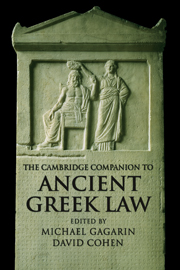Book contents
- Frontmatter
- Introduction
- Part 1: Law in Greece
- Part 2: Law in Athens I: Procedure
- Part 3: Law in Athens II: Substantive Law
- Part 4: Law outside Athens
- Part 5: Other Approaches to Greek Law
- 19 Law, Attic Comedy, and the Regulation of Comic Speech
- 20 Greek Tragedy and Law
- 21 Law and Political Theory
- 22 Law and Nature in Greek Thought
- Bibliography
- Index
22 - Law and Nature in Greek Thought
from Part 5: - Other Approaches to Greek Law
Published online by Cambridge University Press: 28 August 2006
- Frontmatter
- Introduction
- Part 1: Law in Greece
- Part 2: Law in Athens I: Procedure
- Part 3: Law in Athens II: Substantive Law
- Part 4: Law outside Athens
- Part 5: Other Approaches to Greek Law
- 19 Law, Attic Comedy, and the Regulation of Comic Speech
- 20 Greek Tragedy and Law
- 21 Law and Political Theory
- 22 Law and Nature in Greek Thought
- Bibliography
- Index
Summary
Nomos and physis, the Greek words for law and nature, were adaptable to a remarkably wide range of theoretical presuppositions. Philosophers could conjoin them, exploiting their inherent semantic similarities, or they could contrast them, dwelling on salient differences between them that usage and ideology had conferred. There are contexts where either word might be translated by norm (“according to” nomos or “according to” physis) or even by constitution or arrangement; for the physis of something is its basic structure or essence, and nomos identifies such items as musical modes, social customs, divine rules, or codified laws, all of which designate systematic procedures applicable to all members of the class of things to which they pertain. This is not to say that the terms are ever synonymous. A nomos is almost always prescriptive and normative, tinged with the idea of being sanctioned, required, and entailing retributive or harmful consequences if it is ignored. The domain of physis is primarily factual and descriptive. Yet, like “natural” in English, physis could also acquire strongly prescriptive and normative connotations, as in the Hellenistic ethical formula that the best human life needs to be “in agreement with nature” or the Hippocratic physicians' proposals concerning the body's “natural” requirements for health.
- Type
- Chapter
- Information
- The Cambridge Companion to Ancient Greek Law , pp. 412 - 430Publisher: Cambridge University PressPrint publication year: 2005
- 1
- Cited by

